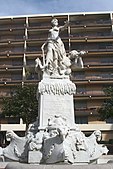Auguste Carli
Auguste Carli | |
|---|---|
| Born | 12 July 1868 Marseille, Bouches-du-Rhône, France |
| Died | 28 January 1930 (aged 61) Paris, France |
| Nationality | French |
| Occupation | Sculptor |
| Relatives | François Carli (brother) |
Auguste Carli (12 July 1868 – 28 January 1930) was a French sculptor.

Biography
Early life
Auguste Carli was born on 12 July 1868 in Marseille, Bouches-du-Rhône, France. His younger brother, François Carli (1872-1957), was also a sculptor.[1][2]
Career
He was a sculptor.
He designed two statues on either side of the main staircase of the Gare de Marseille-Saint-Charles: one, called 'Marseille colonie grecque' ("Marseille, Greek colony") and the other one, called 'Marseille Porte de l'Orient' ("Marseille, door to the East").[3] Additionally, he designed a sculpture on the building of the Caisse d'Épargne on the corner of Cours Pierre Puget and Place Estrangin in Marseille.[1] He also designed a fountain with a sculpture of Amphitrite on the Place Joseph Etienne for Joseph Hippolyte Etienne (1790-1881), which was dedicated in 1906.
He designed a statue of Jesus Christ and Saint Veronica, which is displayed inside the Marseille Cathedral.[4][5][6]
He also designed the tomb of Adolphe Joseph Thomas Monticelli (1824-1886) in the Palais Longchamp Marseille. Additionally, he designed sculptures in the Cimetière Saint-Pierre, a cemetery in Marseille.
Death
He died on 28 January 1930 in Paris.
Legacy
- The Place Auguste et François Carli, a town square in Marseille, is named for him and his brother.[7]
See also
List of works by Auguste Carli
Gallery
-
Sculpture by Auguste Carli on the Caisse d'Épargne building in Marseille
-
'Christ and Saint Veronica' by Auguste Carli inside the Marseille Cathedral
-
Tomb of Adolphe Joseph Thomas Monticelli designed by Auguste Carli in Marseille
-
Fountain with a sculpture of Amphitrite on Place Joseph Etienne in Marseille
-
Statue designed by Auguste Carli in the Cimetière Saint-Pierre in Marseille
-
Another statue designed by Auguste Carli in the Cimetière Saint-Pierre in Marseille
References
- ^ a b Revue de Provence et de Langue d'Oc: artistique, littéraire, scientifique et historique, P. Ruat., 1905, Volumes 7-10, p. 77 [1]
- ^ Bernard Mugnier, La statuaire johannique du XVIe au XXe siècle, Volume 2, 2011, p. 47 [2]
- ^ Leora Auslander, Le genre de la nation, Presses Universitaires du Mirail, 2000, Issue 12, p. 189 [3]
- ^ Dominique Auzias, Marseille 2013 Petit Futé, Le Petit Futé, 4 Apr 2013, p. 388 [4]
- ^ Dominique Auzias, Jean-Paul Labourdette, Les 100 plus belles églises de France 2011 - 2012, Le Petit Futé, 2011, p. 222 [5]
- ^ Liliane Counord, Jean-Paul Labourdette, Gérard Bernar, Dominique Auzias, Petit Futé Provence, Le Petit Futé, 2010, p. 256 [6]
- ^ Google Maps






